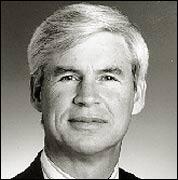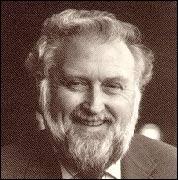Home > Business > Business Headline > Report
Engle, Granger win Nobel Prize for Economics
Agencies |
October 08, 2003 20:46 IST
Last Updated: October 08, 2003 21:00 IST
 American Robert F Engle and Briton Clive W J Granger on Wednesday won the 2003 Nobel Economics Prize for their work in analysing economic time series.
American Robert F Engle and Briton Clive W J Granger on Wednesday won the 2003 Nobel Economics Prize for their work in analysing economic time series.
The Royal Swedish Academy of Sciences decided that the Bank of Sweden Prize in Economic Sciences in Memory of Alfred Nobel, 2003, would be shared between the two 'for methods of analyzing economic time series with time-varying volatility' and 'for methods of analysing economic time series with common trends (cointegration).'
Robert Engle was born in 1942 in Syracuse, NY, USA (American citizen) and got his Ph.D. from Cornell University in 1969. He is Michael Armellino Professor of Management of Financial Services at New York University, NY, USA.
 Clive W J Granger was born in 1934 in Swansea, Wales (British citizen) and obtained his Ph.D. from University of Nottingham in 1959.
Clive W J Granger was born in 1934 in Swansea, Wales (British citizen) and obtained his Ph.D. from University of Nottingham in 1959.
He is emeritus Professor of Economics at University of California at San Diego, USA.
Their research gave economists new tools to evaluate risk by improving analysis of indicators such as economic growth, prices or interest rates over a period of time.
The prize money of 10 million kronor ($1.3 million) will be divided equally between them.
Statistical methods for economic time series
Researchers use data in the form of time series, i.e., chronological sequences of observations, when estimating relationships and testing hypotheses from economic theory. Such time series show the development of GDP, prices, interest rates, stock prices, etc.
 | Also Read |  | |
|
During the 1980s, this year's Laureates devised new statistical methods for dealing with two key properties of many economic time series: time-varying volatility and nonstationarity.
On financial markets, random fluctuations over time - volatility - are particularly significant because the value of shares, options and other financial instruments depends on their risk.
Fluctuations can vary considerably over time; turbulent periods with large fluctuations are followed by calmer periods with small fluctuations.
Despite such time-varying volatility, in want of a better alternative, researchers used to work with statistical methods that presuppose constant volatility.
Robert Engle's discovery was therefore a major breakthrough. He found that the concept of autoregressive conditional heteroskedasticity (ARCH) accurately captures the properties of many time series and developed methods for statistical modeling of time-varying volatility.
His ARCH models have become indispensable tools not only for researchers, but also for analysts on financial markets, who use them in asset pricing and in evaluating portfolio risk.
Most macroeconomic time series follow a stochastic trend, so that a temporary disturbance in, say, GDP has a long-lasting effect.
These time series are called nonstationary; they differ from stationary series which do not grow over time, but fluctuate around a given value.
Clive Granger demonstrated that the statistical methods used for stationary time series could yield wholly misleading results when applied to the analysis of nonstationary data.
His significant discovery was that specific combinations of nonstationary time series may exhibit stationarity, thereby allowing for correct statistical inference.
Granger called this phenomenon cointegration. He developed methods that have become invaluable in systems where short-run dynamics are affected by large random disturbances and long-run dynamics are restricted by economic equilibrium relationships.
Examples include the relations between wealth and consumption, exchange rates and price levels, and short and long-term interest rates.